| Article ID | Journal | Published Year | Pages | File Type |
|---|---|---|---|---|
| 867212 | Biosensors and Bioelectronics | 2013 | 5 Pages |
C-reactive protein (CRP) is an acute phase protein whose levels are increased in many disorders. There exists, in particular, a great deal of interest in the correlation between blood serum levels and the severity of risk for cardiovascular disease. A sensitive, label-free, non-amplified and reusable electrochemical impedimetric biosensor for the detection of CRP in blood serum was developed herein based on controlled and coverage optimised antibody immobilization on standard polycrystalline gold electrodes. Charge transfer resistance changes were highly target specific, linear with log CRP concentration across a 0.5–50 nM range and associated with a limit of detection of 176 pM. Significantly, the detection limits are better than those of current CRP clinical methods and the assays are potentially cheap, relatively automated, reusable, multiplexed and highly portable. The generated interfaces were capable not only of comfortably quantifying CRP across a clinically relevant range of concentrations but also of doing this in whole blood serum with interfaces that were, subsequently, reusable. The importance of optimising receptor layer resistance in maximising assay sensitivity is also detailed.
► An antibody based CRP immunoassay can be generated and operated in whole blood. ► Assay sensitivity can be tuned through initial receptive layer resistance. ► Receptive layers can be regenerated and reused with good fidelity. ► Whole blood assays span entire clinically relevant range.
